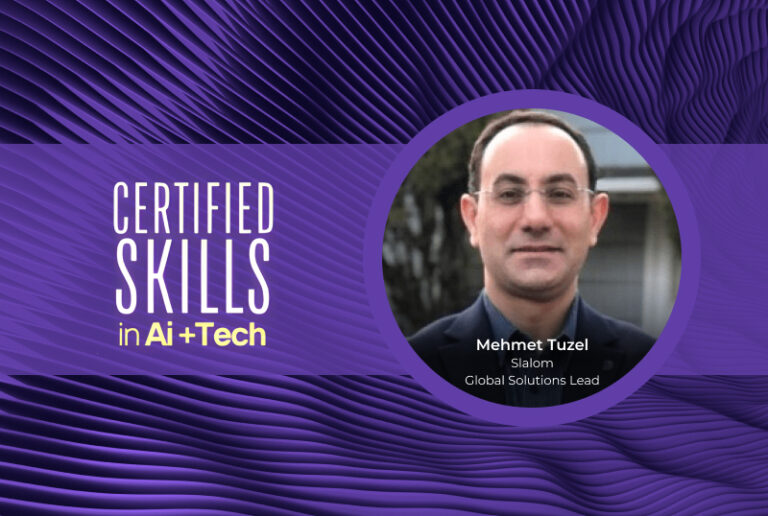In the most recent episode of the Certified Skills in AI and Tech podcast, we’re joined by Mehmet Tuzel, the Global Solutions Lead at Slalom, who shares his expert insights into the transformative role of artificial intelligence within the business sector. Mehmet’s extensive experience at the forefront of AI innovation provides a unique perspective on how AI is reshaping operations, enhancing customer engagement, and catalyzing growth.
What is the problem that you are working on solving at Slalom?
Slalom is a unique blend of professional services firm, deeply passionate about intersecting business, technology, and fundamentally, human values. Our main goal is quite simple: to help people and organizations not just to dream bigger but also to make those dreams a reality, thereby building a better tomorrow for everyone.
When we discuss the services, we offer and the problems we are aiming to solve, it’s about accompanying our clients throughout their entire journey. It’s not just about being a strategic advisor or building digital products. We offer a comprehensive suite of services that truly resonate with our clients’ needs, empowering them to ensure that, even when our direct involvement ends, they are set up for continued success and momentum. In our work with artificial intelligence, we are deeply committed to unlocking the full potential of every organization we partner with. For us, it’s much more than just technology; it’s a pivotal tool that enables businesses to elevate their operations to new heights. Essentially, we are all about people—our clients, their customers, and our team—working together to create something valuable and lasting.
Boosting Customer Satisfaction
How does AI help with customer outcomes?
The impact of AI on enhancing customer insights and personalization is crucial. Starting with data-driven personalization, AI algorithms have an incredible ability to sift through customer data—such as past purchases, browsing behaviors, and preferences—and use that data to tailor recommendations and communications uniquely for each customer.
For instance, e-commerce platforms leveraging AI for product recommendations have seen a notable boost in conversion rates because the products suggested are more likely to interest the customers. There is also the aspect of customer segmentation. AI enables sophisticated segmentation based on a variety of criteria, such as demographic information and behavior patterns. This isn’t just about slicing and dicing data; it’s about crafting more targeted marketing strategies that not only improve the effectiveness of promotional campaigns but also drive a higher return on investment.
Enabling Customer Success with AI
Would you expand on how critical training is to ensure your customers have the right skills?
Training in the realm of AI is not just about imparting knowledge; it’s about bridging a significant gap. There exists a gap between the sophisticated capabilities of AI technologies and the current skill levels of our employees and customers. Without addressing this gap through comprehensive training, the full potential of AI tools risks being underutilized, leading to inefficiencies, which no organization wants. Moreover, the aspect of enhancing user confidence and competency cannot be overstated. Proper training boosts confidence among users, enabling them to interact with AI systems much more effectively. This boost is essential for fostering a culture of experimentation and innovation.
Forecasting the Future
As we look at the rapid acceleration of technology, what are the future trends that you predict in your industry with the rise of AI and its impact on you, your business, and your customers?
In our recent study with 200 C-suite executives across various industries, we explored their perspectives, challenges, and opportunities in AI adoption and transformation for the future. Based on this research, 61% of organizations are actively implementing AI, underscoring its pivotal role in the modern business landscape, and 89% envision AI as a tool to differentiate through accelerated business growth, heightened customer satisfaction, and driving continuous innovation. One of the most important findings from the research is that 41% cited a shortage of skilled employees as a major hurdle in AI transformation, the most common non-technical obstacle.
Looking ahead at the future of AI in business, it’s quite fascinating to consider the breadth and depth of its integration. We are on the cusp of seeing AI weave itself into virtually every business function you can think of, such as customer service, HR, finance, marketing, manufacturing, and supply chain. The beauty of this integration lies in its ability to not only streamline operations but also significantly elevate the decision-making process. Tools like predictive analytics offer insights in real-time that were previously out of reach. The rise of AI is catalyzing a significant shift in job roles and skills requirements, especially towards roles that manage AI systems and drive strategic decision-making. This shift underscores the importance of upskilling and reskilling, preparing our workforce for the future, and designing new operating models. Far from replacing jobs, AI is set to augment human capabilities, enhancing our creativity, problem-solving, and improving our ability to innovate. This synergy promises to amplify the value of human intuition and emotional intelligence in decision-making.
Kryterion’s Approach to AI-integrated Test Development and Delivery
At Kryterion, we clearly see the opportunities and disruption that AI is bringing to our industry. Our top priority is to provide clients with the best mix of security, innovation, service, and value in our tools for test development and delivery. AI is quickly becoming an integral technology in our products and direction. The path we are on with AI encompasses the immediate benefits it provides while maintaining a sharp awareness of its evolution allowing us to ensure our products continue to meet or exceed the needs of our clients.
Please contact us to set up a meeting so we can further discuss how important AI is to our future and our clients.
Want to keep up with insights on AI in the testing industry? Listen to the Kryterion podcast






